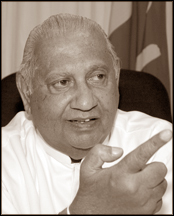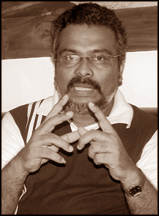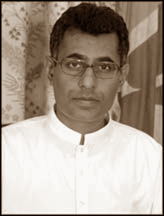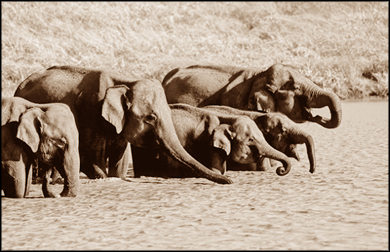|
Sixtieth anniversary of Department of Wildlife
Conservation:
'Wildlife if nourished, good money spinner'
by Sajitha PREMATUNGE
Over the 60 years the DWC (Department of Wildlife Conservation) has
been in existence, it has been responsible for the management of a
network of more than 90 PAs (Protected Areas) an equivalent of 13% of
the total land area of the island. Migratory birds as well as fish
species come under its jurisdiction. It is also the implementing
government body of such international conventions such as CITES (the
Convention on International Trade in Endangered Species of Wild Fauna
and Flora) and Ramsar.
 |
 |
 |
| Prime
Minister Ratnasiri Wickremanayake |
Minister of
Environment and Natural Resources, Patali Champika Ranawaka |
Minister of Tourism
Nandana Gunathilaka |
At a ceremony organized to commemorate the 60th anniversary of the
DWC - which was established in October 1, 1949 - winners of the poster,
photography and painting competitions were awarded certificates by Chief
Guest Prime Minister Ratnasiri Wickremanayake, Minister of Environment
and Natural Resources, Patali Champika Ranawaka and Minister of Tourism
Nandana Gunathilaka. Appreciation awards for forest rangers as well as
staffers and officers of the DWC and its staff members who died while on
duty, were also presented during the ceremony. A special envelope was
also issued to commemorate the 60th anniversary of the DWC. Publications
on elephants of Sri Lanka and a souvenir for the 60th anniversary were
also launched during the ceremony. An exhibition was held from October 1
to 3 to commemorate the anniversary.
The Prime Minister pointed out that scientists predict a trying time
in terms of global warming and climate change. Weather changes are
increasing in number. Wildlife, nature and natural phenomena like
climate are interlinked and therefore conservation of wildlife is of
utmost importance for the survival of mankind. Consequently the duty
bestowed upon the DWC is not to be taken for granted. And the Department
has considerably developed with the times. He stressed the importance of
a sustainable development, methods like reforestation. "We do not
require the services of voluntary organizations that act as puppets of
funding nations" said the Prime Minister.
The Prime Minister pointed out that the tourism industry has a close
relationship with wildlife and that it was important to develop tourism
in such a way not detrimental to Sri Lankan culture.
Minister of Tourism Nandana Gunathilaka said that we have a legacy of
wildlife conservation. "Our literature and culture can vouch for this.
Sri Lankans are intrinsically nature loving, irrespective of religion."
Reinforcing the fact that wildlife and tourism go hand in hand, Minister
Gunathilaka said that there is a lot to be gained, specially
economically, by protecting natural resources. "Yala earns over 4 lakhs
a day from one single gate! If we take a commercial perspective wildlife
is the best commodity we could use to promote tourism in Sri Lanka."
Minister Champika Ranawaka said that the obstacles that the DWC had
to face during its 60 years in existence has only made the establishment
stronger.
"We have been able to strengthen the legal standards concerning
wildlife conservation as well as improve the infrastructure of the DWC",
said the Minister. Pas - that is more than 12,000,000 ha. Including
twenty parks - are managed by the DWC and the lack of staffers and
labourers have always been a serious managerial setback. An additional
400 personnel have been recruited to the workforce last year alone, says
the Minister. Hundreds of kilometers of roads have been renovated. He
also revealed that parks like Lunugamvehera, Udawalawa have been
revamped. Kumana National Park will be reopened shortly. The Minister
also revealed that they hope to commence the conservation process of the
Wilpattu National Park by next year and that the DWC is working to
reopen all NPs (National Parks) including Chandikulam and Mudhu next
year.
The Minister also revealed that they are also working on solutions
for the human elephant conflict. According to the latest statistics
there are more than 6000 elephants in Sri Lanka - the number has doubled
in the last 15 years - 70% of them are outside PAs. "Although culling
has been practised in the 1950's, it is no longer an option", said the
Minister. He added that the work done by the DWC regarding the
human-elephant conflict is not to be taken lightly. "The DWC staff has
saved countless lives of lost and wounded elephants."
One of the major problems encountered by the Gaja Mithuro project is
that all the Pas have exceeded their carrying capacity, terrorism and
unplanned villages only added to this constraint. Until 2008 electric
fences were put up at the rate of 60 kms per year. "But with the
dedication of DWC staff we have been able to increase it up to five
times, over 300 kms.
A massive research - costing around Rs. 3000 million - on villages
affected by the human-elephant conflict is to begin next year.
The dry zone of Sri Lanka is facing and extreme drought situation due
to which wildlife in the area has to undergo much hardship, pointed out
the Minister.
 Weather changes in rain patterns can be identified as the cause.
"This is bound to intensify over the next few decades with global
warming. This is a problem that required immediate attention because
most of our national parks are situated in the dry zone" and warned that
our dry zone may one day face the same problem of desertification faced
today by African countries. Weather changes in rain patterns can be identified as the cause.
"This is bound to intensify over the next few decades with global
warming. This is a problem that required immediate attention because
most of our national parks are situated in the dry zone" and warned that
our dry zone may one day face the same problem of desertification faced
today by African countries.
"Citizens of developed nations enjoy certain privileges in spite of
their unplanned and untimely industrialization and development", said
the Prime Minister, and claimed that the so-called developed nations
should work to provide third world countries with what is rightfully
theirs, by making penance for their unplanned development activities.
Minister Champika Ranawaka claimed that the sole cause for this
situation is the over exploitation by the so-called developed nations.
"They have deprived the basic human rights of over seven million people
suffering in the dry zone."
The Minister also revealed that it will be proposed at the next
Copenhagen Summit that every industrialized country pay 1% of their
Gross National Income to low carbon emitting countries, for conservation
activities and the betterment of their living standards. "They have
achieved such development at the expense of whole ecosystems."
Over 100 countries including Bolivia is working towards making this a
reality. "Our priority should be to protect the country's water
resources which are in imminent danger due to global warming."
He said that the ten year national action plan Haritha Lanka was
formulated to achieve just this.
|

